Health Sociology: Analyzing Health Through Social Perspectives
VerifiedAdded on 2023/06/10
|6
|1946
|430
Essay
AI Summary
This essay delves into the realm of health sociology, examining how social factors influence health outcomes. It begins by highlighting the increasing social injustice and inequality resulting from globalization and technological advancements, prompting the WHO to address social determinants of health. The essay explores sociological theories, contrasting the conflict and functionalist perspectives. The conflict theory emphasizes societal competition for resources and discrimination in healthcare, while the functionalist theory underscores the importance of health for societal stability. Furthermore, the essay contrasts the social and medical models of disability, advocating for a shift from individual impairment to societal inclusion. The assignment concludes by emphasizing the need to reduce hierarchy in healthcare and promote individual agency in maintaining health. Desklib provides students access to similar solved assignments and past papers for academic support.
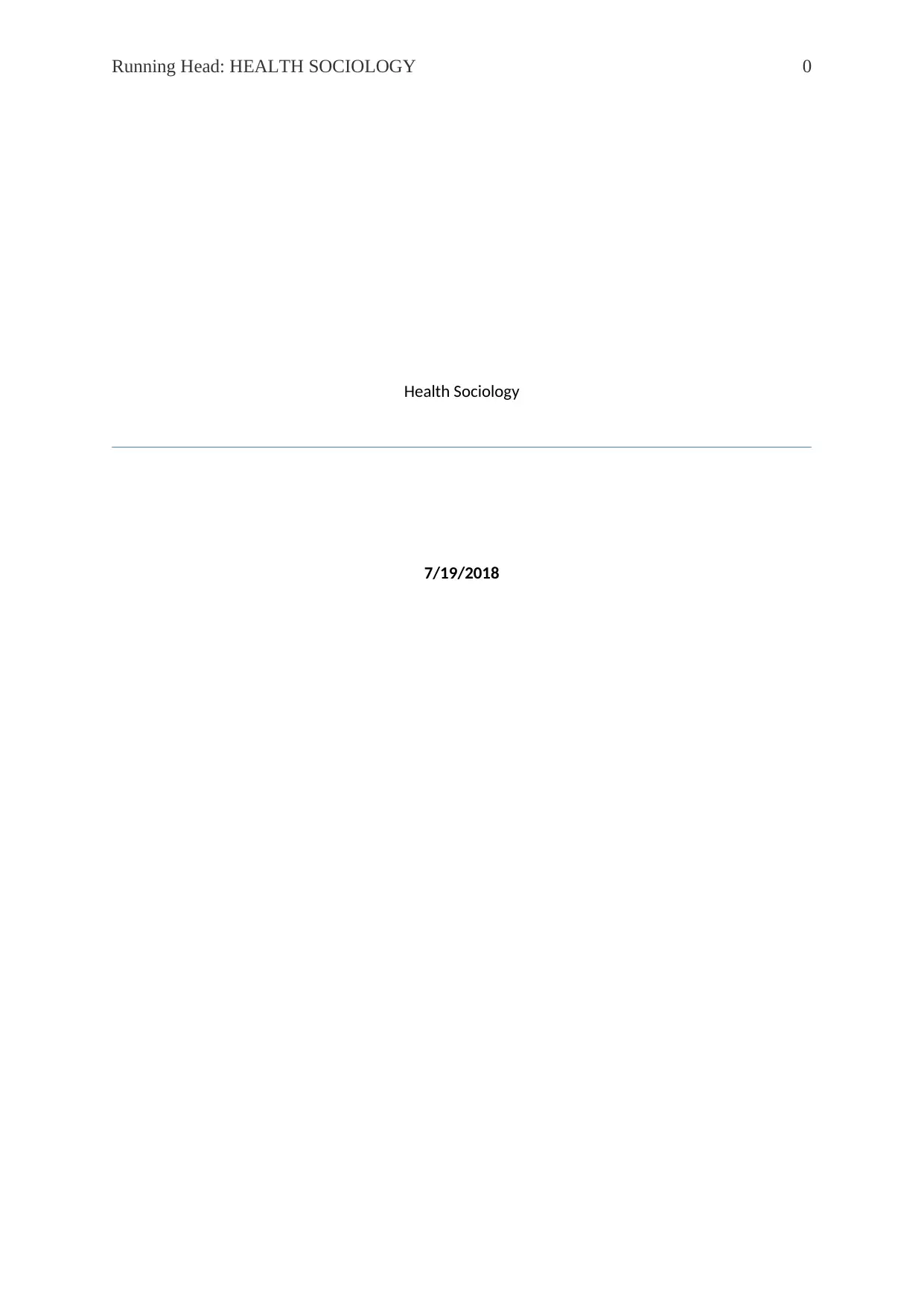
Running Head: HEALTH SOCIOLOGY 0
Health Sociology
7/19/2018
Health Sociology
7/19/2018
Secure Best Marks with AI Grader
Need help grading? Try our AI Grader for instant feedback on your assignments.
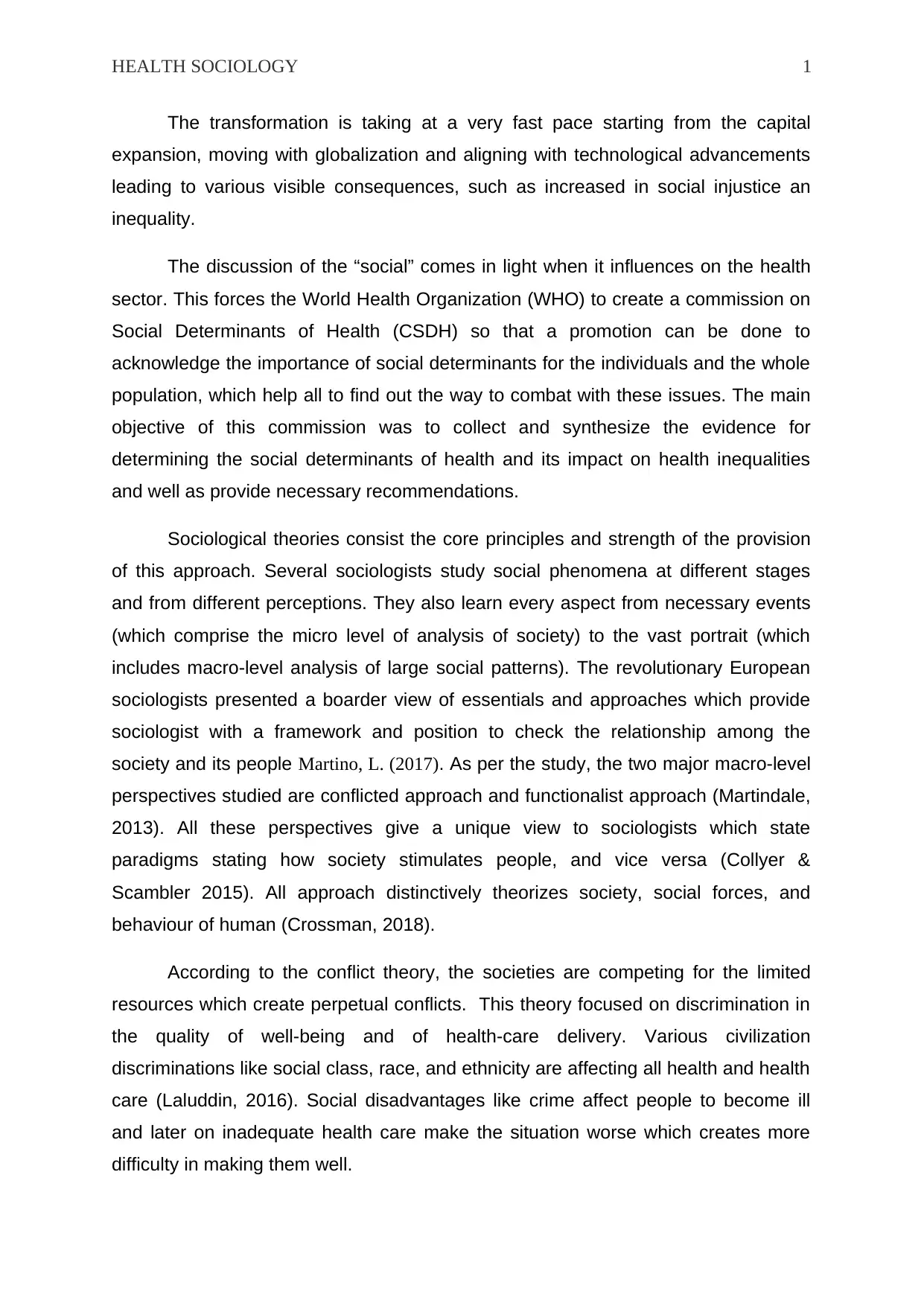
HEALTH SOCIOLOGY 1
The transformation is taking at a very fast pace starting from the capital
expansion, moving with globalization and aligning with technological advancements
leading to various visible consequences, such as increased in social injustice an
inequality.
The discussion of the “social” comes in light when it influences on the health
sector. This forces the World Health Organization (WHO) to create a commission on
Social Determinants of Health (CSDH) so that a promotion can be done to
acknowledge the importance of social determinants for the individuals and the whole
population, which help all to find out the way to combat with these issues. The main
objective of this commission was to collect and synthesize the evidence for
determining the social determinants of health and its impact on health inequalities
and well as provide necessary recommendations.
Sociological theories consist the core principles and strength of the provision
of this approach. Several sociologists study social phenomena at different stages
and from different perceptions. They also learn every aspect from necessary events
(which comprise the micro level of analysis of society) to the vast portrait (which
includes macro-level analysis of large social patterns). The revolutionary European
sociologists presented a boarder view of essentials and approaches which provide
sociologist with a framework and position to check the relationship among the
society and its people Martino, L. (2017). As per the study, the two major macro-level
perspectives studied are conflicted approach and functionalist approach (Martindale,
2013). All these perspectives give a unique view to sociologists which state
paradigms stating how society stimulates people, and vice versa (Collyer &
Scambler 2015). All approach distinctively theorizes society, social forces, and
behaviour of human (Crossman, 2018).
According to the conflict theory, the societies are competing for the limited
resources which create perpetual conflicts. This theory focused on discrimination in
the quality of well-being and of health-care delivery. Various civilization
discriminations like social class, race, and ethnicity are affecting all health and health
care (Laluddin, 2016). Social disadvantages like crime affect people to become ill
and later on inadequate health care make the situation worse which creates more
difficulty in making them well.
The transformation is taking at a very fast pace starting from the capital
expansion, moving with globalization and aligning with technological advancements
leading to various visible consequences, such as increased in social injustice an
inequality.
The discussion of the “social” comes in light when it influences on the health
sector. This forces the World Health Organization (WHO) to create a commission on
Social Determinants of Health (CSDH) so that a promotion can be done to
acknowledge the importance of social determinants for the individuals and the whole
population, which help all to find out the way to combat with these issues. The main
objective of this commission was to collect and synthesize the evidence for
determining the social determinants of health and its impact on health inequalities
and well as provide necessary recommendations.
Sociological theories consist the core principles and strength of the provision
of this approach. Several sociologists study social phenomena at different stages
and from different perceptions. They also learn every aspect from necessary events
(which comprise the micro level of analysis of society) to the vast portrait (which
includes macro-level analysis of large social patterns). The revolutionary European
sociologists presented a boarder view of essentials and approaches which provide
sociologist with a framework and position to check the relationship among the
society and its people Martino, L. (2017). As per the study, the two major macro-level
perspectives studied are conflicted approach and functionalist approach (Martindale,
2013). All these perspectives give a unique view to sociologists which state
paradigms stating how society stimulates people, and vice versa (Collyer &
Scambler 2015). All approach distinctively theorizes society, social forces, and
behaviour of human (Crossman, 2018).
According to the conflict theory, the societies are competing for the limited
resources which create perpetual conflicts. This theory focused on discrimination in
the quality of well-being and of health-care delivery. Various civilization
discriminations like social class, race, and ethnicity are affecting all health and health
care (Laluddin, 2016). Social disadvantages like crime affect people to become ill
and later on inadequate health care make the situation worse which creates more
difficulty in making them well.
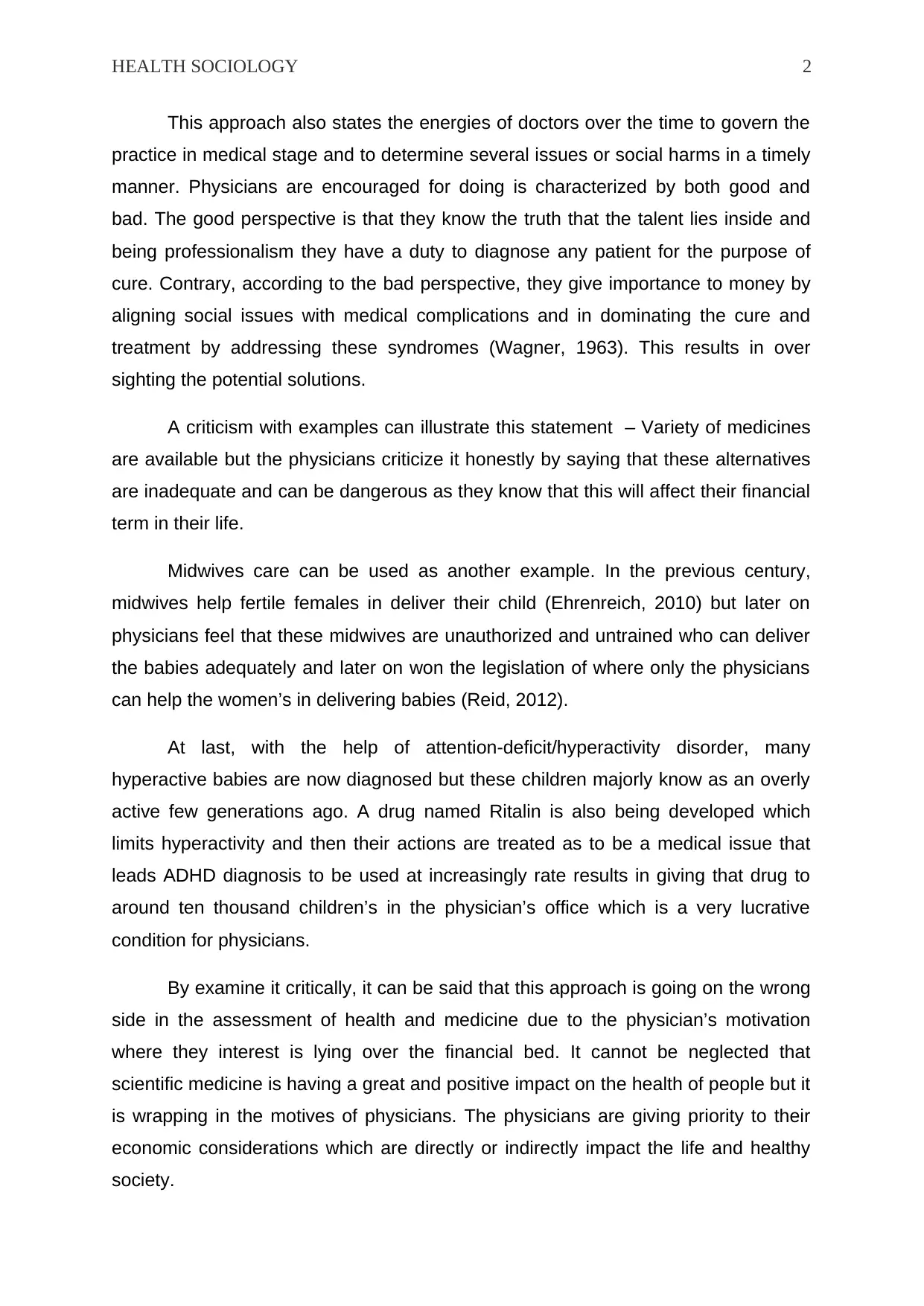
HEALTH SOCIOLOGY 2
This approach also states the energies of doctors over the time to govern the
practice in medical stage and to determine several issues or social harms in a timely
manner. Physicians are encouraged for doing is characterized by both good and
bad. The good perspective is that they know the truth that the talent lies inside and
being professionalism they have a duty to diagnose any patient for the purpose of
cure. Contrary, according to the bad perspective, they give importance to money by
aligning social issues with medical complications and in dominating the cure and
treatment by addressing these syndromes (Wagner, 1963). This results in over
sighting the potential solutions.
A criticism with examples can illustrate this statement – Variety of medicines
are available but the physicians criticize it honestly by saying that these alternatives
are inadequate and can be dangerous as they know that this will affect their financial
term in their life.
Midwives care can be used as another example. In the previous century,
midwives help fertile females in deliver their child (Ehrenreich, 2010) but later on
physicians feel that these midwives are unauthorized and untrained who can deliver
the babies adequately and later on won the legislation of where only the physicians
can help the women’s in delivering babies (Reid, 2012).
At last, with the help of attention-deficit/hyperactivity disorder, many
hyperactive babies are now diagnosed but these children majorly know as an overly
active few generations ago. A drug named Ritalin is also being developed which
limits hyperactivity and then their actions are treated as to be a medical issue that
leads ADHD diagnosis to be used at increasingly rate results in giving that drug to
around ten thousand children’s in the physician’s office which is a very lucrative
condition for physicians.
By examine it critically, it can be said that this approach is going on the wrong
side in the assessment of health and medicine due to the physician’s motivation
where they interest is lying over the financial bed. It cannot be neglected that
scientific medicine is having a great and positive impact on the health of people but it
is wrapping in the motives of physicians. The physicians are giving priority to their
economic considerations which are directly or indirectly impact the life and healthy
society.
This approach also states the energies of doctors over the time to govern the
practice in medical stage and to determine several issues or social harms in a timely
manner. Physicians are encouraged for doing is characterized by both good and
bad. The good perspective is that they know the truth that the talent lies inside and
being professionalism they have a duty to diagnose any patient for the purpose of
cure. Contrary, according to the bad perspective, they give importance to money by
aligning social issues with medical complications and in dominating the cure and
treatment by addressing these syndromes (Wagner, 1963). This results in over
sighting the potential solutions.
A criticism with examples can illustrate this statement – Variety of medicines
are available but the physicians criticize it honestly by saying that these alternatives
are inadequate and can be dangerous as they know that this will affect their financial
term in their life.
Midwives care can be used as another example. In the previous century,
midwives help fertile females in deliver their child (Ehrenreich, 2010) but later on
physicians feel that these midwives are unauthorized and untrained who can deliver
the babies adequately and later on won the legislation of where only the physicians
can help the women’s in delivering babies (Reid, 2012).
At last, with the help of attention-deficit/hyperactivity disorder, many
hyperactive babies are now diagnosed but these children majorly know as an overly
active few generations ago. A drug named Ritalin is also being developed which
limits hyperactivity and then their actions are treated as to be a medical issue that
leads ADHD diagnosis to be used at increasingly rate results in giving that drug to
around ten thousand children’s in the physician’s office which is a very lucrative
condition for physicians.
By examine it critically, it can be said that this approach is going on the wrong
side in the assessment of health and medicine due to the physician’s motivation
where they interest is lying over the financial bed. It cannot be neglected that
scientific medicine is having a great and positive impact on the health of people but it
is wrapping in the motives of physicians. The physicians are giving priority to their
economic considerations which are directly or indirectly impact the life and healthy
society.
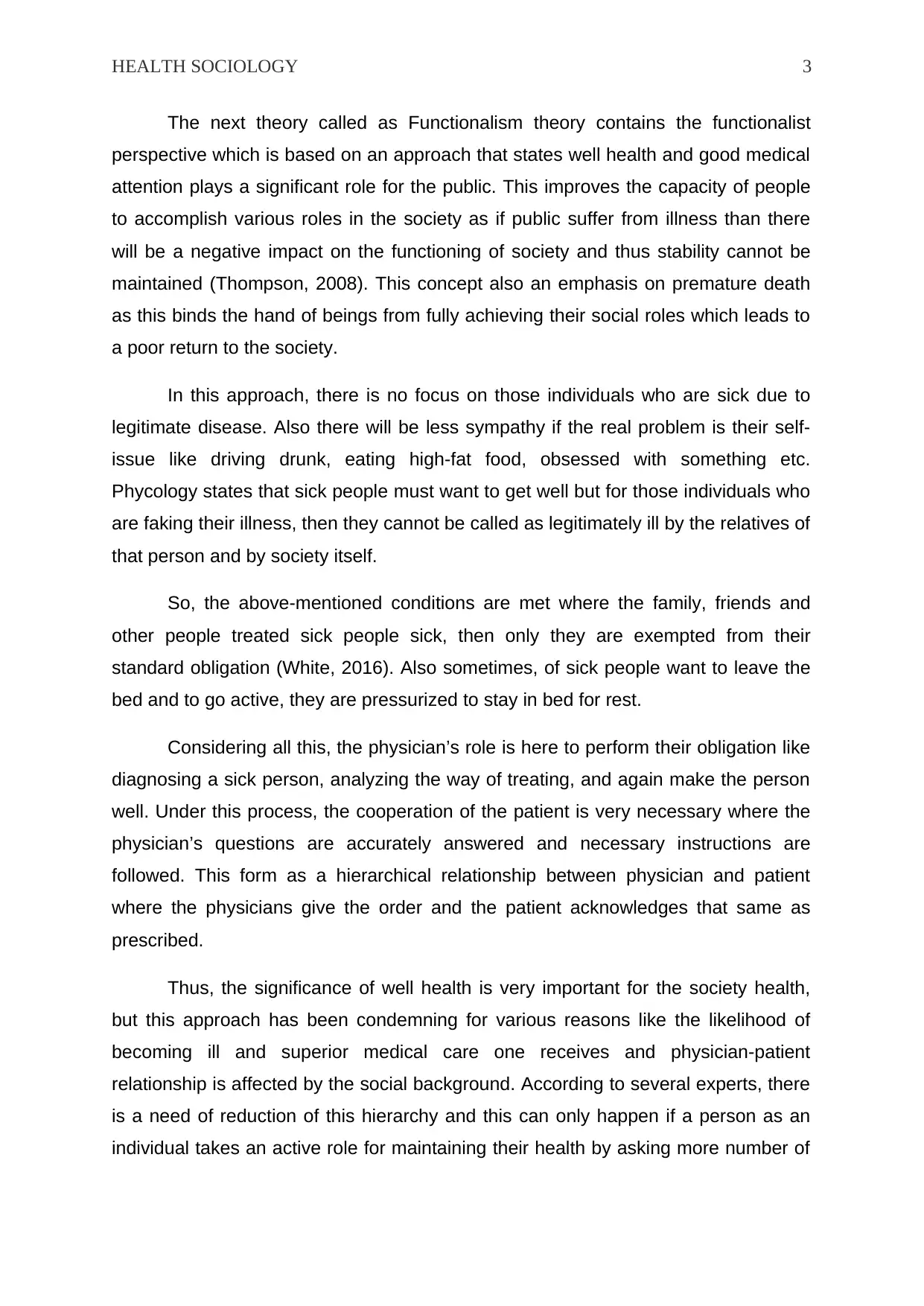
HEALTH SOCIOLOGY 3
The next theory called as Functionalism theory contains the functionalist
perspective which is based on an approach that states well health and good medical
attention plays a significant role for the public. This improves the capacity of people
to accomplish various roles in the society as if public suffer from illness than there
will be a negative impact on the functioning of society and thus stability cannot be
maintained (Thompson, 2008). This concept also an emphasis on premature death
as this binds the hand of beings from fully achieving their social roles which leads to
a poor return to the society.
In this approach, there is no focus on those individuals who are sick due to
legitimate disease. Also there will be less sympathy if the real problem is their self-
issue like driving drunk, eating high-fat food, obsessed with something etc.
Phycology states that sick people must want to get well but for those individuals who
are faking their illness, then they cannot be called as legitimately ill by the relatives of
that person and by society itself.
So, the above-mentioned conditions are met where the family, friends and
other people treated sick people sick, then only they are exempted from their
standard obligation (White, 2016). Also sometimes, of sick people want to leave the
bed and to go active, they are pressurized to stay in bed for rest.
Considering all this, the physician’s role is here to perform their obligation like
diagnosing a sick person, analyzing the way of treating, and again make the person
well. Under this process, the cooperation of the patient is very necessary where the
physician’s questions are accurately answered and necessary instructions are
followed. This form as a hierarchical relationship between physician and patient
where the physicians give the order and the patient acknowledges that same as
prescribed.
Thus, the significance of well health is very important for the society health,
but this approach has been condemning for various reasons like the likelihood of
becoming ill and superior medical care one receives and physician-patient
relationship is affected by the social background. According to several experts, there
is a need of reduction of this hierarchy and this can only happen if a person as an
individual takes an active role for maintaining their health by asking more number of
The next theory called as Functionalism theory contains the functionalist
perspective which is based on an approach that states well health and good medical
attention plays a significant role for the public. This improves the capacity of people
to accomplish various roles in the society as if public suffer from illness than there
will be a negative impact on the functioning of society and thus stability cannot be
maintained (Thompson, 2008). This concept also an emphasis on premature death
as this binds the hand of beings from fully achieving their social roles which leads to
a poor return to the society.
In this approach, there is no focus on those individuals who are sick due to
legitimate disease. Also there will be less sympathy if the real problem is their self-
issue like driving drunk, eating high-fat food, obsessed with something etc.
Phycology states that sick people must want to get well but for those individuals who
are faking their illness, then they cannot be called as legitimately ill by the relatives of
that person and by society itself.
So, the above-mentioned conditions are met where the family, friends and
other people treated sick people sick, then only they are exempted from their
standard obligation (White, 2016). Also sometimes, of sick people want to leave the
bed and to go active, they are pressurized to stay in bed for rest.
Considering all this, the physician’s role is here to perform their obligation like
diagnosing a sick person, analyzing the way of treating, and again make the person
well. Under this process, the cooperation of the patient is very necessary where the
physician’s questions are accurately answered and necessary instructions are
followed. This form as a hierarchical relationship between physician and patient
where the physicians give the order and the patient acknowledges that same as
prescribed.
Thus, the significance of well health is very important for the society health,
but this approach has been condemning for various reasons like the likelihood of
becoming ill and superior medical care one receives and physician-patient
relationship is affected by the social background. According to several experts, there
is a need of reduction of this hierarchy and this can only happen if a person as an
individual takes an active role for maintaining their health by asking more number of
Secure Best Marks with AI Grader
Need help grading? Try our AI Grader for instant feedback on your assignments.
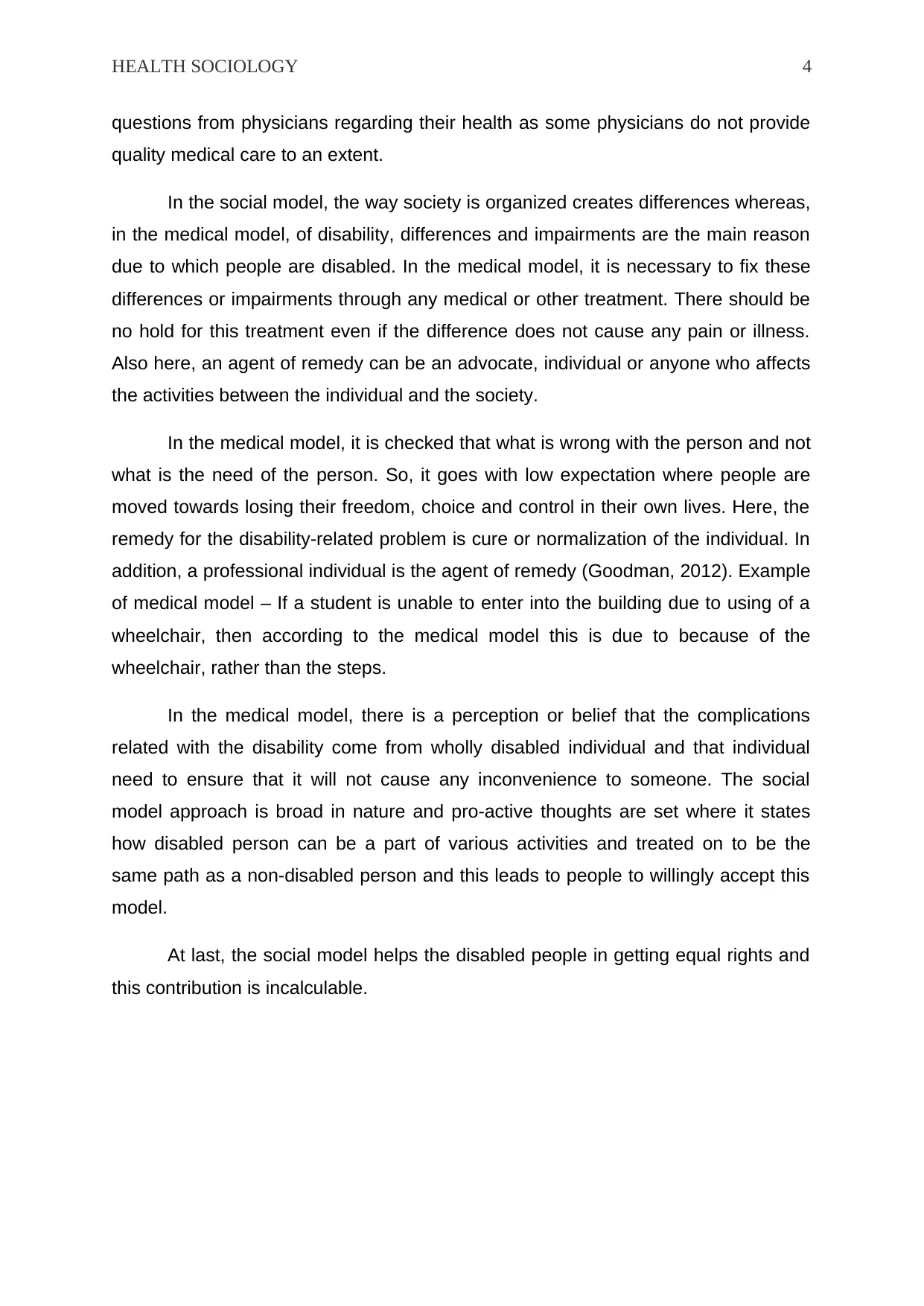
HEALTH SOCIOLOGY 4
questions from physicians regarding their health as some physicians do not provide
quality medical care to an extent.
In the social model, the way society is organized creates differences whereas,
in the medical model, of disability, differences and impairments are the main reason
due to which people are disabled. In the medical model, it is necessary to fix these
differences or impairments through any medical or other treatment. There should be
no hold for this treatment even if the difference does not cause any pain or illness.
Also here, an agent of remedy can be an advocate, individual or anyone who affects
the activities between the individual and the society.
In the medical model, it is checked that what is wrong with the person and not
what is the need of the person. So, it goes with low expectation where people are
moved towards losing their freedom, choice and control in their own lives. Here, the
remedy for the disability-related problem is cure or normalization of the individual. In
addition, a professional individual is the agent of remedy (Goodman, 2012). Example
of medical model – If a student is unable to enter into the building due to using of a
wheelchair, then according to the medical model this is due to because of the
wheelchair, rather than the steps.
In the medical model, there is a perception or belief that the complications
related with the disability come from wholly disabled individual and that individual
need to ensure that it will not cause any inconvenience to someone. The social
model approach is broad in nature and pro-active thoughts are set where it states
how disabled person can be a part of various activities and treated on to be the
same path as a non-disabled person and this leads to people to willingly accept this
model.
At last, the social model helps the disabled people in getting equal rights and
this contribution is incalculable.
questions from physicians regarding their health as some physicians do not provide
quality medical care to an extent.
In the social model, the way society is organized creates differences whereas,
in the medical model, of disability, differences and impairments are the main reason
due to which people are disabled. In the medical model, it is necessary to fix these
differences or impairments through any medical or other treatment. There should be
no hold for this treatment even if the difference does not cause any pain or illness.
Also here, an agent of remedy can be an advocate, individual or anyone who affects
the activities between the individual and the society.
In the medical model, it is checked that what is wrong with the person and not
what is the need of the person. So, it goes with low expectation where people are
moved towards losing their freedom, choice and control in their own lives. Here, the
remedy for the disability-related problem is cure or normalization of the individual. In
addition, a professional individual is the agent of remedy (Goodman, 2012). Example
of medical model – If a student is unable to enter into the building due to using of a
wheelchair, then according to the medical model this is due to because of the
wheelchair, rather than the steps.
In the medical model, there is a perception or belief that the complications
related with the disability come from wholly disabled individual and that individual
need to ensure that it will not cause any inconvenience to someone. The social
model approach is broad in nature and pro-active thoughts are set where it states
how disabled person can be a part of various activities and treated on to be the
same path as a non-disabled person and this leads to people to willingly accept this
model.
At last, the social model helps the disabled people in getting equal rights and
this contribution is incalculable.
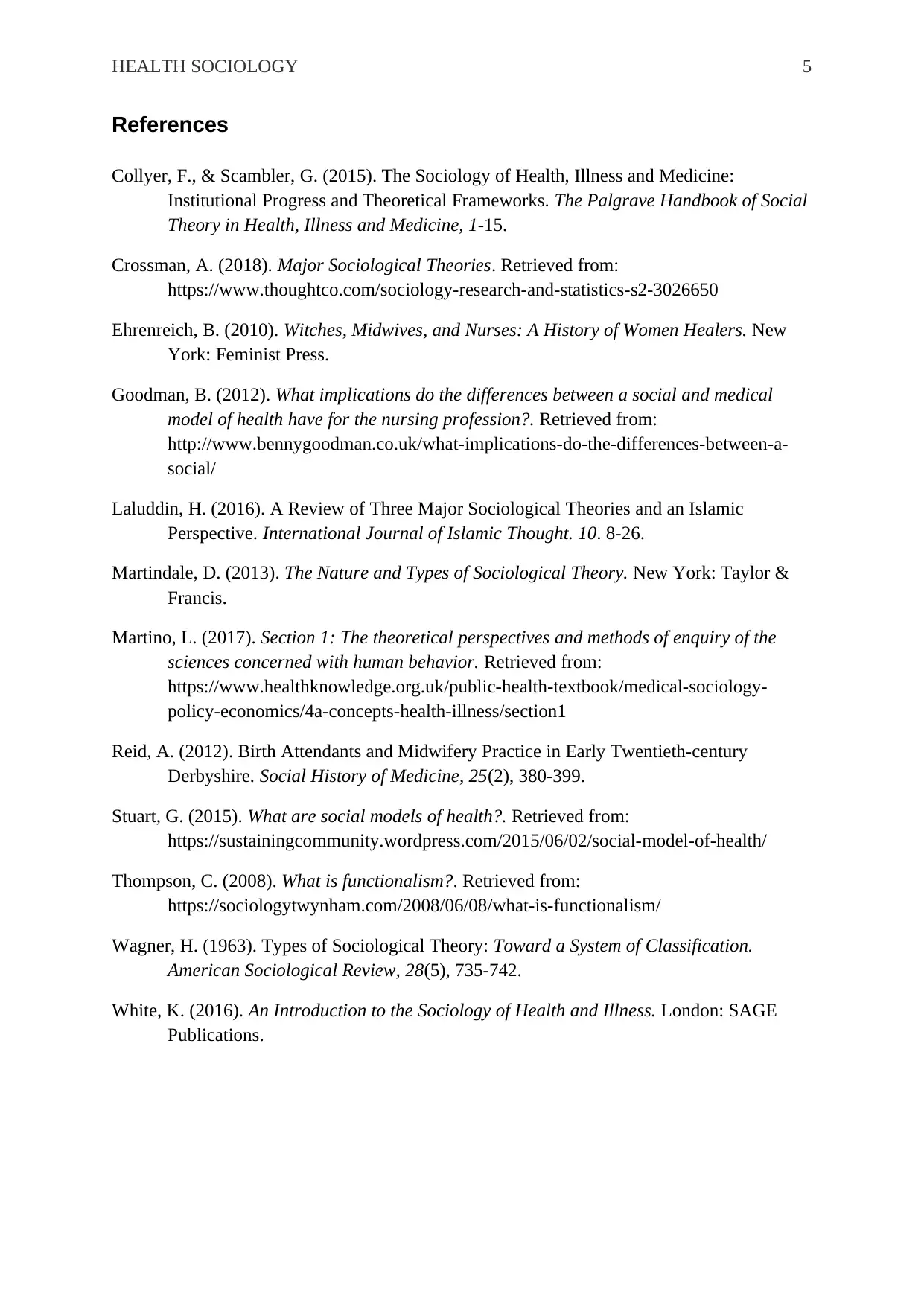
HEALTH SOCIOLOGY 5
References
Collyer, F., & Scambler, G. (2015). The Sociology of Health, Illness and Medicine:
Institutional Progress and Theoretical Frameworks. The Palgrave Handbook of Social
Theory in Health, Illness and Medicine, 1-15.
Crossman, A. (2018). Major Sociological Theories. Retrieved from:
https://www.thoughtco.com/sociology-research-and-statistics-s2-3026650
Ehrenreich, B. (2010). Witches, Midwives, and Nurses: A History of Women Healers. New
York: Feminist Press.
Goodman, B. (2012). What implications do the differences between a social and medical
model of health have for the nursing profession?. Retrieved from:
http://www.bennygoodman.co.uk/what-implications-do-the-differences-between-a-
social/
Laluddin, H. (2016). A Review of Three Major Sociological Theories and an Islamic
Perspective. International Journal of Islamic Thought. 10. 8-26.
Martindale, D. (2013). The Nature and Types of Sociological Theory. New York: Taylor &
Francis.
Martino, L. (2017). Section 1: The theoretical perspectives and methods of enquiry of the
sciences concerned with human behavior. Retrieved from:
https://www.healthknowledge.org.uk/public-health-textbook/medical-sociology-
policy-economics/4a-concepts-health-illness/section1
Reid, A. (2012). Birth Attendants and Midwifery Practice in Early Twentieth-century
Derbyshire. Social History of Medicine, 25(2), 380-399.
Stuart, G. (2015). What are social models of health?. Retrieved from:
https://sustainingcommunity.wordpress.com/2015/06/02/social-model-of-health/
Thompson, C. (2008). What is functionalism?. Retrieved from:
https://sociologytwynham.com/2008/06/08/what-is-functionalism/
Wagner, H. (1963). Types of Sociological Theory: Toward a System of Classification.
American Sociological Review, 28(5), 735-742.
White, K. (2016). An Introduction to the Sociology of Health and Illness. London: SAGE
Publications.
References
Collyer, F., & Scambler, G. (2015). The Sociology of Health, Illness and Medicine:
Institutional Progress and Theoretical Frameworks. The Palgrave Handbook of Social
Theory in Health, Illness and Medicine, 1-15.
Crossman, A. (2018). Major Sociological Theories. Retrieved from:
https://www.thoughtco.com/sociology-research-and-statistics-s2-3026650
Ehrenreich, B. (2010). Witches, Midwives, and Nurses: A History of Women Healers. New
York: Feminist Press.
Goodman, B. (2012). What implications do the differences between a social and medical
model of health have for the nursing profession?. Retrieved from:
http://www.bennygoodman.co.uk/what-implications-do-the-differences-between-a-
social/
Laluddin, H. (2016). A Review of Three Major Sociological Theories and an Islamic
Perspective. International Journal of Islamic Thought. 10. 8-26.
Martindale, D. (2013). The Nature and Types of Sociological Theory. New York: Taylor &
Francis.
Martino, L. (2017). Section 1: The theoretical perspectives and methods of enquiry of the
sciences concerned with human behavior. Retrieved from:
https://www.healthknowledge.org.uk/public-health-textbook/medical-sociology-
policy-economics/4a-concepts-health-illness/section1
Reid, A. (2012). Birth Attendants and Midwifery Practice in Early Twentieth-century
Derbyshire. Social History of Medicine, 25(2), 380-399.
Stuart, G. (2015). What are social models of health?. Retrieved from:
https://sustainingcommunity.wordpress.com/2015/06/02/social-model-of-health/
Thompson, C. (2008). What is functionalism?. Retrieved from:
https://sociologytwynham.com/2008/06/08/what-is-functionalism/
Wagner, H. (1963). Types of Sociological Theory: Toward a System of Classification.
American Sociological Review, 28(5), 735-742.
White, K. (2016). An Introduction to the Sociology of Health and Illness. London: SAGE
Publications.
1 out of 6
Related Documents
Your All-in-One AI-Powered Toolkit for Academic Success.
+13062052269
info@desklib.com
Available 24*7 on WhatsApp / Email
![[object Object]](/_next/static/media/star-bottom.7253800d.svg)
Unlock your academic potential
© 2024 | Zucol Services PVT LTD | All rights reserved.





